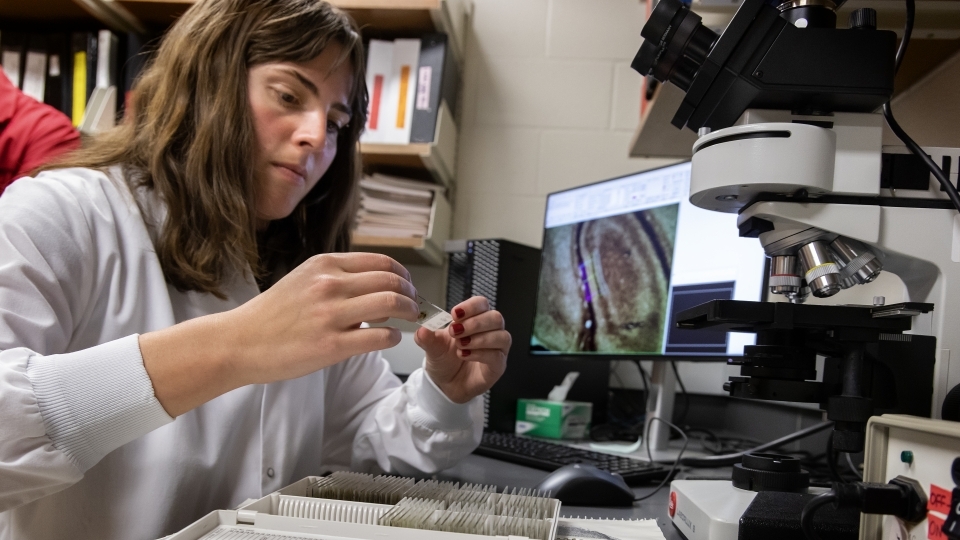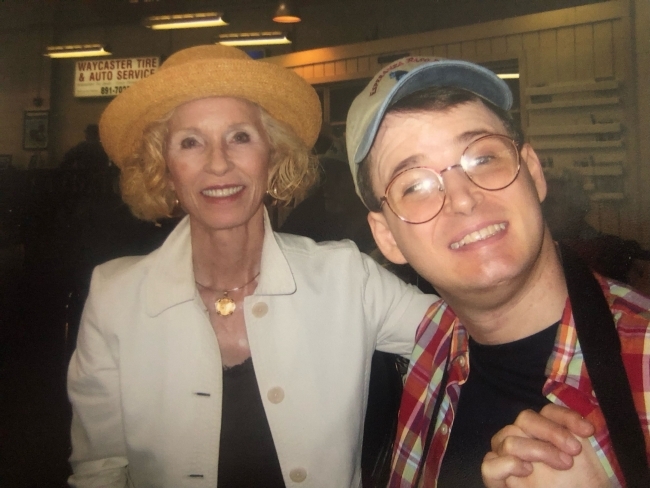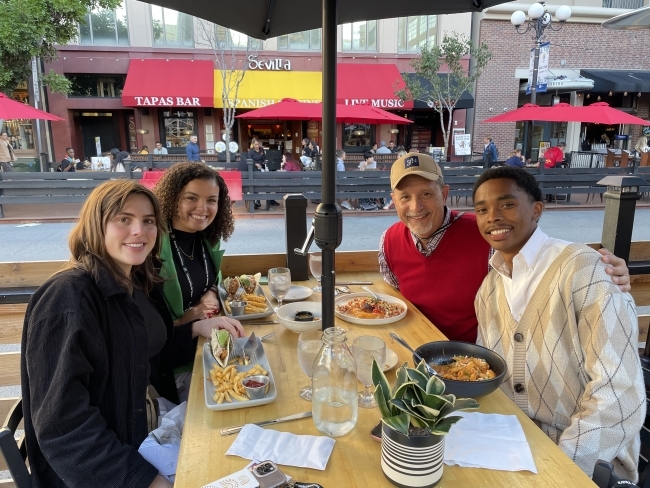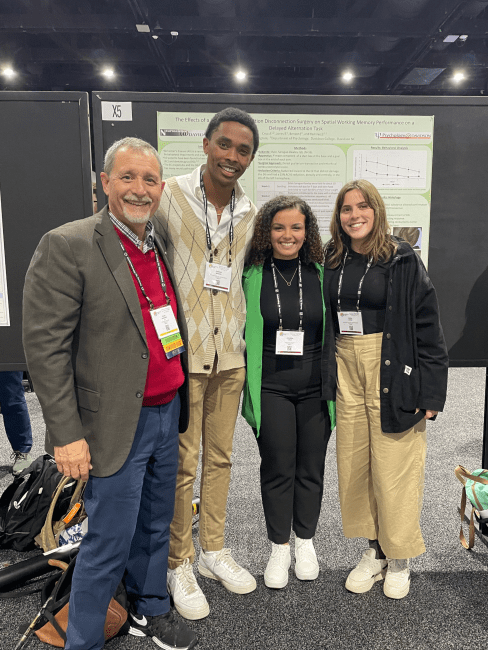Healing Research, Supportive Allies
August 12, 2024
- Author
- Caroline Roy '20

Emma Jones '23 was one of two inaugural recipients of the Foil Neuroscience Research Award. She received funding for two consecutive summers researching degenerative brain diseases at Davidson.
His younger brother, Philip, sustained a traumatic brain injury (TBI) at the age of 16 after a nearly fatal car crash. Since then, Marty Foil III ’85 has dedicated his life to helping Philip and others living with TBIs receive holistic care and find fulfillment at Hinds’ Feet Farm — a community-based program in Huntersville, North Carolina. Founded by his mother, Carolyn “Puddin” Van Every Foil and his father, Martin Foil Jr. ’55, the farm provides residential and day programs for individuals with brain injuries.

Marty’s mother, Carolyn “Puddin” Van Every Foil and his brother, Phil
A fifth-generation Davidsonian, Foil hails from a family of alums. For him and his wife, Lisa Burger Foil ’86, giving back to the college means supporting the causes closest to their hearts, including providing funding for neuroscience research, mental health resources and programs for LGBTQIA+ students.
“It’s really important to me to honor my brother and the life he lived after his injury,” Foil said. “Through the farm and through giving to Davidson, we hope to spread awareness and understanding of the brain injury community and encourage more and more talented people to enter the neuroscience field.”
Martin ’85 and Lisa ’86 Foil Neuroscience Research Award
The inaugural recipients of the Foil Neuroscience Research Award, Emma Jones ’23 and Jordan Benson ’23 received funding for two consecutive summers researching degenerative brain diseases at Davidson.
Jones arrived on campus interested in mental health, biology and the brain, so when Julio Ramirez, the R. Stuart Dickson Professor of Psychology, encouraged her to take his behavioral neuroscience class, a lightbulb went off.
She worked with Ramirez in the lab that year and the following summer, and with the help of the Foil Award, took on a long-term research project studying neurodegeneration in rats.
“The summer experiences I had were super unique in the amount of responsibility I had,” Jones said. “I learned to rely on myself and think as an independent researcher. Getting that type of experience as an undergraduate was so valuable — it’s helped me pivot into the mental health field.”

Emma Jones ’23, Amanda Cruz ’22, Prof. Julio Ramirez and Jordan Benson ’23 around the table before presenting at the Society for Neuroscience Conference in San Diego, California
For the past year, Jones has worked as a clinical research coordinator in Boston, studying transcranial magnetic stimulation as a treatment for depression.
Like Jones, Benson has spent the past year expanding upon his undergraduate research. A research assistant at Boston Children’s Hospital, he now works with live imaging to examine the brain at a molecular level.
As a Davidson student working in Ramirez’s lab, he was drawn to the physics side of neuroscience, examining synapses, electricity and regenerative pathways in the brain. After receiving the Foil Award, he spent a summer on campus digging deeper into this research.
“I’m fascinated by systems in general, whether it’s on a molecular level or a societal one,” Benson said. “Studying the brain means looking at the center of all human systems.”
Support from the Foil Award allowed him and Jones to attend the Society for Neuroscience (SfN) conference in San Diego, California, where they presented a poster and learned about different types of neuro-research happening around the world.

Prof. Julio Ramirez, Jordan Benson ’23, Amanda Cruz ’22 and Emma Jones ’23 with the poster they presented at the Society for Neuroscience Conference in San Diego, California
Benson and Jones both served as outreach partners for Hinds’ Feet Farm’s Unmasking Brain Injury project, a global initiative that helps TBI survivors tell their stories and spread awareness by creating masks — outward representations of what it’s like to live with a brain injury.
“I really enjoyed meeting the Foil family and getting to learn about everything they’ve accomplished at Hinds Feet Farm,” Benson said. “Even though our research at Davidson was relatively small-scale, Marty made it feel very personal and impactful for him and his family.”
LGBTQIA+ Health and Wellness and Student Initiatives Funds
Beyond neuroscience, the Foils also focus their philanthropy on programming and holistic health and well-being resources for LGBTQIA+ students at Davidson. Their youngest child is transgender, and the family is actively engaged in advocacy for the queer community.
“When we were at Davidson, there wasn’t much support for LGBTQIA+ students,” Lisa said. “Our family understands what that journey can be like for a young adult. Many students don’t have a supportive home life or don’t decide to come out until college. Anything we can do to bolster those initiatives is close to our hearts.”
Since 2020, the Foils have supported the LGBTQIA+ Student Initiatives Fund, which strengthens campus gathering spaces like the Lavender Lounge and, in partnership with the Center for Student Diversity and Inclusion and Queers and Allies (Q&A), creates and sustains a host of events and programs.
For Bonner Scholar Mav Smith ’26, Q&A’s annual Queersgiving dinner stands out as an important event for LGBTQIA+ students who may not be welcomed home during the holidays.
“Not everyone has the option of being with family on Thanksgiving,” Smith said. “This event is a great chance to build connections with other queer people. It really helped me feel less alone and more comfortable during a difficult time.”
Counselor Jasmine Peters joined Davidson’s Health and Well-Being staff in 2020 as the college’s first ever LGBTQIA+ specialist, a position created thanks to support from generous donors. In four years of working with Davidson students, Peters sees a great need for specialized support as LGBTQIA+ students navigate their identities away from home.
“It can be difficult as part of a marginalized group to find a true sense of belonging on Davidson’s campus,” she said. “As I conducted outreach and got to know the students, I learned that many of them truly needed someone who could address their unique struggles and concerns.”
While she’s equipped to address these concerns as a counselor, Peters knows students often need help beyond what the college offers. Many don’t have the means to seek external mental health or medical care. Others are uninsured or cut off from their families. Through the Foil fund, students can easily access confidential financial support and find the off-campus resources they need.
“It’s been so beneficial to know that I can support students in this way,” Peters said. “Davidson students are thoughtful, self-aware and committed to becoming better people. The Foil fund shows me that I’m not doing this work alone.”



